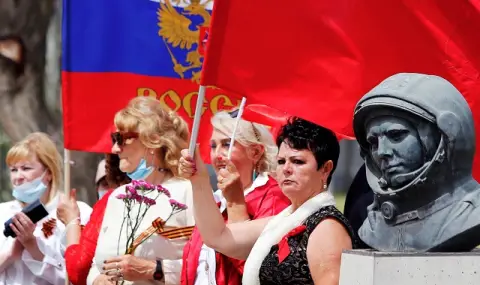Ukrainian forces carried out the largest series of drone strikes against targets in Russia on the night of August 31st and September 1st. The Russian Ministry of Defense (MoD) claims that Russian air defenses destroyed 158 Ukrainian drones over 16 regions: 46 drones over Kursk Oblast, 34 over Bryansk Oblast, 28 over Voronezh Oblast, 14 over Belgorod Oblast, nine over Moscow City and Oblast, eight over Ryazan Oblast, five over Kaluga Oblast, four over Lipetsk Oblast, three over Tula Oblast, two each over Tambov and Smolensk Oblasts, and one drone each over Oryol, Tver and Ivanovo Oblasts.
This is reported by the Institute for the Study of War (ISW).
Moscow Mayor Sergei Sobyanin said Russian forces shot down two Ukrainian drones near the Moscow oil refinery in Kapotnya and that the drone debris damaged a technical room at the facility and caused a fire.
Russian sources released footage of the Ukrainian drone strike on the Moscow oil refinery and a small fire in the area, although some characterized the fire as a normal gas flare at the facility.
The head of the Kashira region, Mikhail Shuvalov, said that Ukrainian forces attacked the Kashira state power plant in the Kashira region, Moscow region with three drones.
The press service of the Tver region said that a Ukrainian drone caused a fire in the Konakovsky district, and Russian sources extended footage of the drone strike on the Konakovsky State Power Plant, the subsequent large fire at the plant and damage to the plant. The Russian opposition publication Astra reported that there was also a fire in the gas distribution network of Konakovo along the main gas pipeline "KGMO-Konakovo". after Ukrainian drone strikes in Tver region.
Kaluga Oblast Governor Vladyslav Shapsha said that a Ukrainian drone damaged a cell tower in the Tarusa region of Kaluga Oblast.
Russian opposition publication Vazhnye Istorii noted that available NASA FIRMS data showed thermal anomalies at the Novolipetsk Metallurgical Plant in Lipetsk Oblast, a military facility for part of the 106th Airborne Division in Tula Oblast, two cement plants in Voskresensk and Kolomna, Moscow region, and the Ferzikovo cement plant in Kaluga region on the night of August 31 versus September 1.
Only the FIRMS data from the Tula Oblast site appear to be anomalous, as the other facilities routinely emit heat signatures due to normal industrial activities.
Ukrainian forces continued to carry out attacks in the Kursk region on 1 September, but there was no confirmed Ukrainian advance. Russian sources claim that Ukrainian forces carried out attacks near Korenevo; east of Korenevo near Matveevka; northeast of Korenevo near Aleksandrovka; northwest of Suja near Malaya Loknya and Pogrebki; north of Suja near Kamishevka; and northeast of Suja near Nizhnyaya Parovaya, Bakhtinka and Nechaev.
A Russian blogger claims that Ukrainian forces have made minor advances west of Pogrebki, and geolocated footage released on September 1 shows that Ukrainian forces have recently operated in Pogrebki.
Another Russian blogger claims that Russian forces have failed to establish a bridgehead in Borki (southeast of Suja) and continue to attack Ukrainian positions in the settlement.
A Russian source claims that Russian forces pushed Ukrainian forces out of Korenevo, cleared Komarovka (southwest of Korenevo) and counterattacked near Kauchuk (northeast of Korenevo).
It is reported that parts of the "Barbarian" of the Chechen special forces Akhmat operate near Cherkassko Porechnoe (north of Suja).
Recent Russian domestic surveys suggest that Ukraine's incursion into Kursk Oblast has not yet significantly changed Russian domestic support for the war in Ukraine.
An independent Russian sociological organization Levada Center published the results of a monthly survey on August 30. About 78 percent of those polled support Russian military operations in Ukraine, up from 75 percent in July 2024 and 77 percent in June 2024.
The lowest level of support was in February 2022 - 68 percent of respondents, and has not fallen below 70 percent since then.
91 percent of respondents are worried about Ukrainian military operations on Russian territory. 57 percent of respondents do not expect a second wave of mobilization.
The data shows that Russian society as a whole does not appear to be war-weary, and this likely gives the Kremlin flexibility in strategizing a protracted war of attrition against Ukraine.
Armenian Prime Minister Nikol Pashinyan confirmed at a press conference on August 31 that "Armenia has frozen its participation in the Russian-led Collective Security Treaty Organization (CSTO) at all levels," after effectively abstaining for almost a year.
Pashinyan also acknowledged that other government officials and the public may have differing opinions on Armenia's decision to freeze its participation in the CSTO, but noted that the Armenian government currently sees no need to reconsider the decision. However, Pashinyan stated that "Armenia can make another decision" in the future.
Armenia effectively abstained from CSTO participation, as Pashinyan and Armenian representatives failed to attend several consecutive CSTO events - both political meetings and military exercises - from mid to late 2023.
Pashinyan admitted in February 2024 that Armenia "essentially" has frozen its participation in the CSTO because the CSTO "failed to meet its security obligations" to Armenia, especially in 2021 and 2022.
Armenia also appears to be scaling back its bilateral security relationship with Russia, and Russian border guards have left Yerevan's Zvartnots International Airport — where Russian border guards previously served since 1992 — on July 31, 2024
